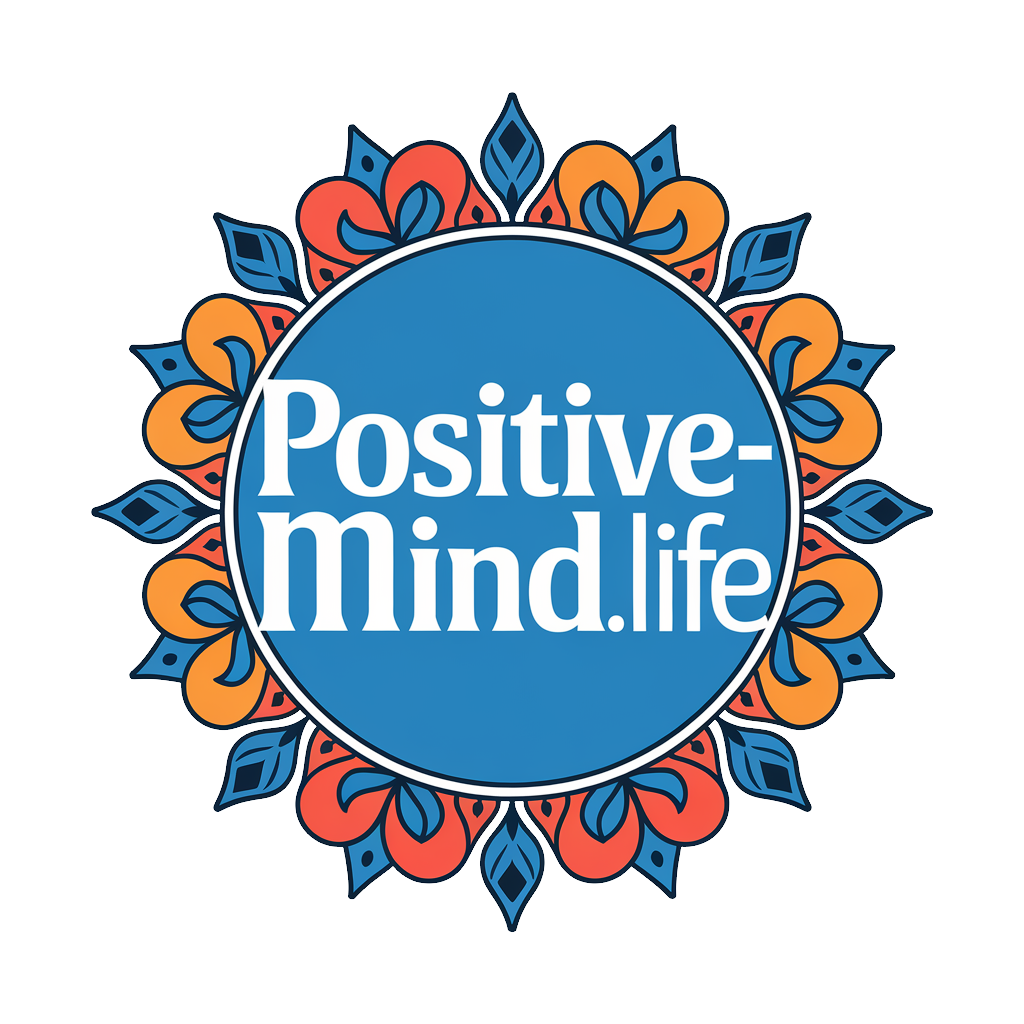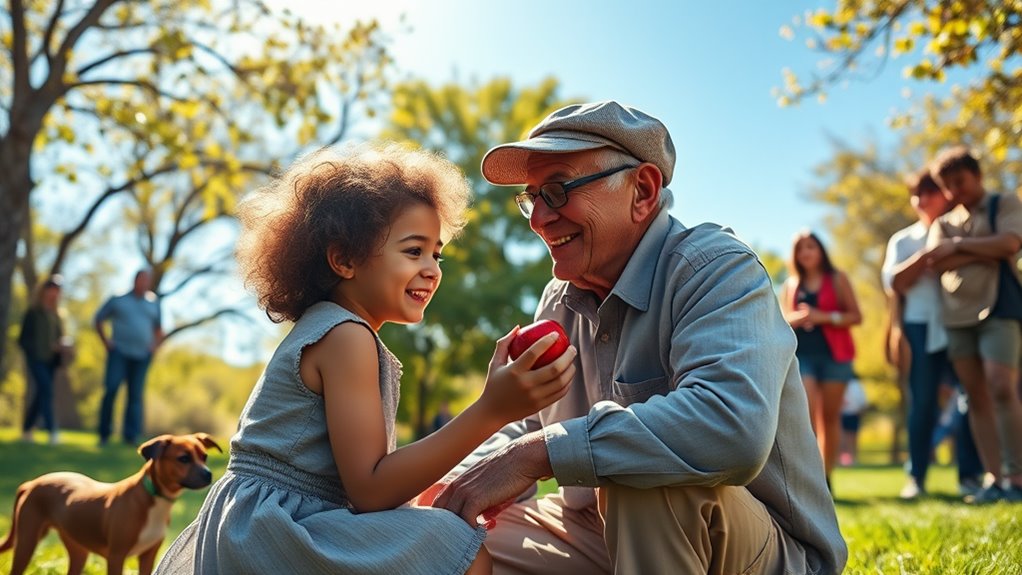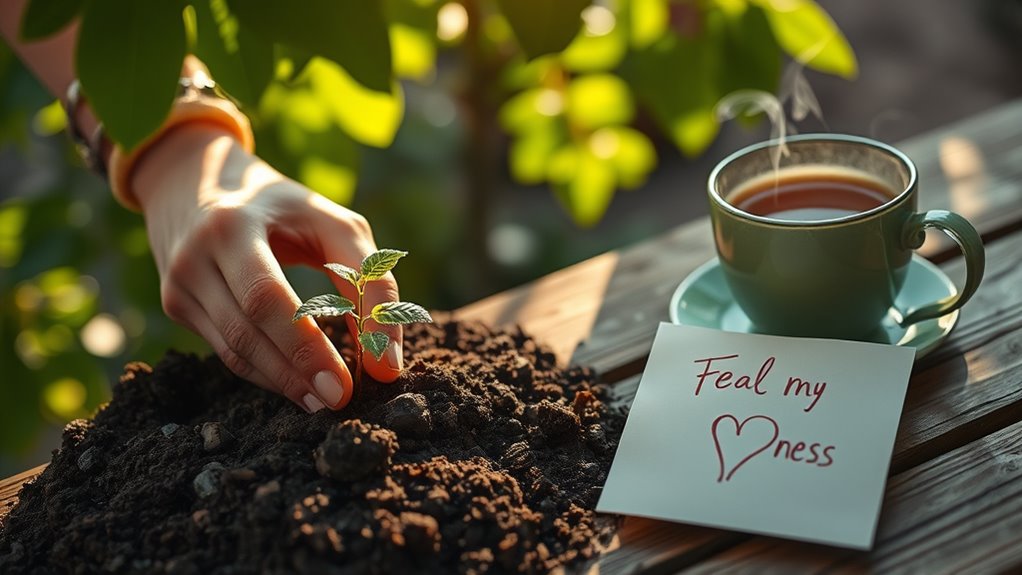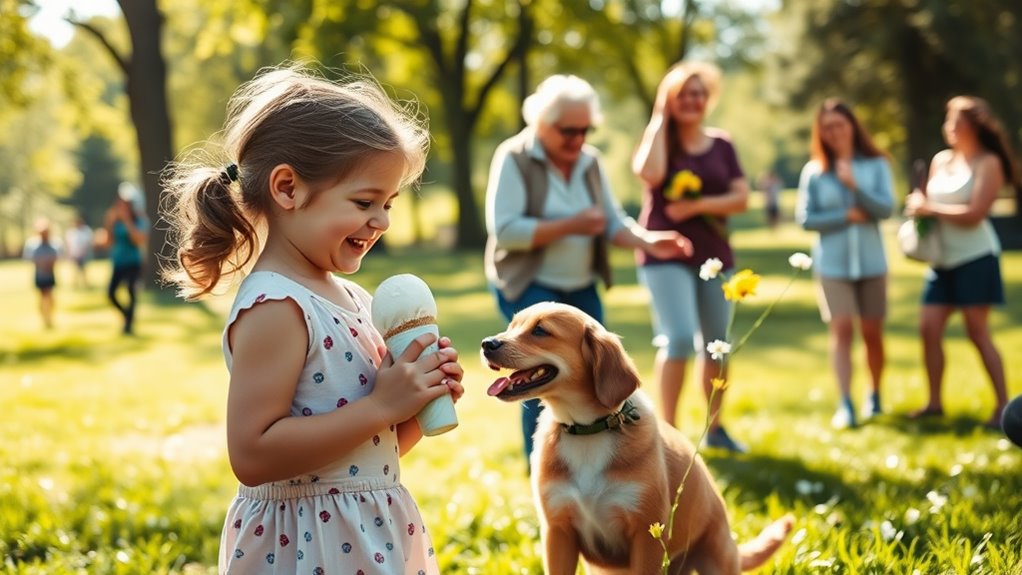This One Random Act of Kindness Will Restore Your Faith in Humanity!
One random act of kindness can truly restore your faith in humanity, like when an elderly man chased down a young woman who dropped her wallet. This brief encounter not only bonded them but inspired the woman to engage in community service. Kindness has remarkable effects, fostering connections and promoting a positive atmosphere in communities. By performing small gestures like complimenting someone or holding the door open, you can initiate a ripple effect of generosity. Such acts make individuals feel valued and uplift spirits, encouraging more kindness in society. Discovering more examples can inspire you to take action.
A Heartwarming True Story
In a bustling city, a simple act of kindness can resonate deeply within a community. Picture this: a young woman, rushing to catch her train, accidentally drops her wallet. Moments later, an elderly man notices it on the ground. Instead of keeping it or ignoring it, he picks it up and runs after her, calling out to return it. This brief encounter doesn’t just restore her belongings but also her faith in humanity.
As the young woman gratefully accepts her wallet, she learns that the man has faced his own hardships. Despite his struggles, he believes in helping others. This interaction sparks a conversation that reveals their shared experiences, creating an unexpected bond between two strangers.
The impact of this act extends beyond the two individuals involved. The young woman feels inspired and decides to pay it forward. She starts volunteering at a local shelter, encouraging others to engage in acts of kindness. The elderly man, too, feels a renewed sense of purpose, sharing his story with friends and family. This heartwarming true story illustrates how one small act can initiate a ripple effect, encouraging a culture of kindness within the community.
The Power of Kindness
Kindness holds an undeniable power that can transform lives and communities. When you engage in acts of kindness, whether big or small, you contribute to a positive atmosphere that encourages others to do the same. This creates a nurturing environment where compassion thrives and relationships deepen.
Studies have shown that kindness can lead to improved mental health, both for those receiving kindness and those giving it. When you perform a kind act, your brain releases feel-good hormones like oxytocin and serotonin, which enhance your mood and overall well-being.
Moreover, kindness fosters social connections. People are naturally drawn to those who treat them with respect and empathy. By practicing kindness, you build trust and strengthen bonds within your community. This can lead to a supportive network where individuals feel valued and understood.
In a world that often focuses on negativity, your commitment to kindness can serve as a beacon of hope. It encourages resilience and brings people together, proving that simple gestures can indeed make a significant impact. Embracing kindness is not just beneficial for others; it elevates your own life, creating a cycle of positivity that benefits everyone involved.
Ripple Effects of Generosity
Generosity extends the principles of kindness, creating ripple effects that can touch countless lives. When you practice generosity, you’re not just impacting the immediate recipient; you’re influencing a broader community. Each act can inspire further acts of kindness, leading to significant societal change. Consider the following ripple effects of generosity:
- Encouragement of Others: Your generous actions can motivate those around you to reciprocate, fostering a culture of kindness.
- Strengthening Connections: Generosity often builds stronger relationships, as people feel valued and appreciated.
- Increased Positivity: Generous acts can enhance the overall mood of a community, promoting a more optimistic outlook.
- Community Growth: Generosity can lead to improved resources, as individuals come together to support one another.
- Long-term Change: Sustained generosity can result in significant societal shifts, influencing policies and community standards.
Simple Acts to Try Today
While it may seem small, incorporating simple acts of kindness into your daily routine can have a profound impact on those around you. Here are a few easy ways to get started today:
| Act of Kindness | Description | Impact |
|---|---|---|
| Compliment a stranger | A genuine compliment can brighten someone’s day. | Boosts mood and confidence. |
| Hold the door open | A simple gesture that shows consideration. | Promotes courtesy and respect. |
| Share a smile | Smiling can be contagious and uplifting. | Creates a positive atmosphere. |
| Leave a note of encouragement | A thoughtful note can inspire and uplift someone’s spirits. | Fosters a sense of belonging. |
These small actions require little effort but can significantly enhance someone’s day. By practicing these simple acts, you not only contribute to a more positive environment but also inspire others to reciprocate kindness. You’ll find that even a small gesture can create a ripple effect, spreading goodwill and warmth throughout your community. So why not give it a try? You might just be the reason someone believes in the goodness of humanity today.
Inspiring Others Through Kindness
Small acts of kindness can often inspire a broader culture of compassion within communities. When you engage in simple, thoughtful gestures, you not only uplift others but also encourage them to pay it forward. This chain reaction can create a ripple effect, fostering a more caring environment.
Here are some ways you can inspire others through kindness:
- Share a compliment: A few kind words can brighten someone’s day and motivate them to spread positivity.
- Volunteer your time: Helping local charities or organizations sets an example for others to follow.
- Practice active listening: Giving someone your full attention shows that you value them, encouraging deeper connections.
- Offer help to a neighbor: Whether it’s running errands or lending a hand with chores, your support can inspire community bonds.
- Organize a kindness challenge: Create a fun initiative that encourages friends and family to perform acts of kindness throughout the week.
Frequently Asked Questions
What Is the Origin of the Phrase “Random Act of Kindness”?
The phrase “random act of kindness” emerged in the 1980s, popularized by the book “Random Acts of Kindness” by Anne Herbert. It highlights spontaneous, selfless gestures that uplift others, creating ripples of goodwill in society.
How Can I Encourage My Friends to Participate in Kindness Acts?
To encourage your friends, share inspiring stories of kindness, suggest simple actions they can take, and lead by example. Organizing group activities focused on helping others can also foster a supportive environment for kindness.
Are There Any Studies on the Effects of Kindness on Mental Health?
Studies show that performing acts of kindness can boost happiness by 41%. Engaging in kind behaviors not only improves your mental health but also fosters stronger connections with others, creating a positive cycle of well-being.
What Are Some Examples of Kindness in Different Cultures?
Kindness manifests differently across cultures. For instance, in Japan, gift-giving symbolizes appreciation, while in India, helping neighbors reflects community spirit. In Western cultures, volunteering and charitable acts are common expressions of kindness and generosity.
How Can I Track My Own Acts of Kindness Over Time?
You could keep a journal, noting specific acts like helping a neighbor with groceries. By regularly reviewing your entries, you’ll see patterns, motivating you to continue spreading kindness and reflecting on your personal growth over time.



